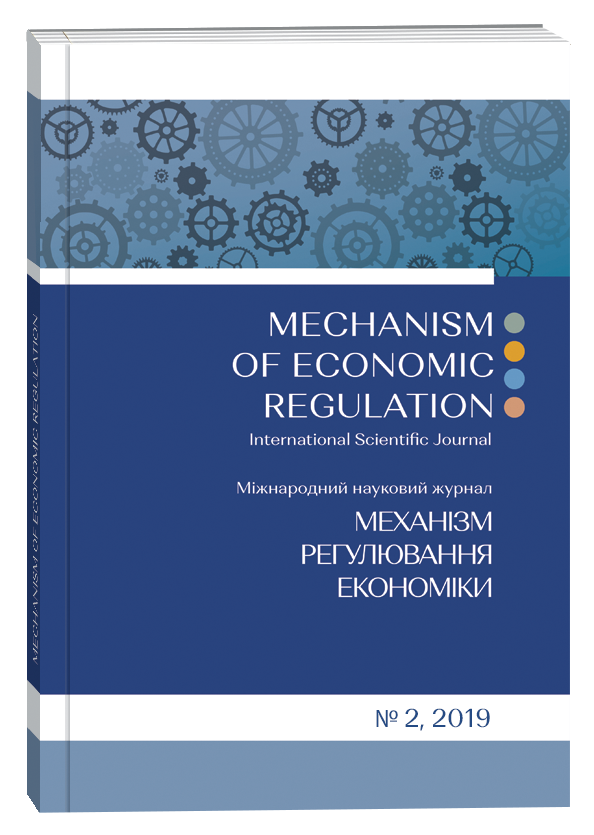EUROPEAN EXPERIENCE OF THE STATE REGULATION PECULIARITIES IN EDUCATION: CASE-STUDY OF POLAND, SLOVENIA, CZECH REPUBLIC
Abstract
The current vector of Ukraine's development is the Eurointegration course, which requires the transformation of domestic systems of national economy management, including such a key part of the system as education. The European educational space is characterized by common features that, in general, are unified in most of the bloc countries. Despite this, national education systems have retained their peculiarities in the course of the formation and transition to European values. In particular, the experience of individual countries such as Poland, Slovenia and the Czech Republic, which have common features with Ukraine in geographical, historical, cultural and other dimensions, is important enough to determine the general vectors to develop the national system of state regulation of education, which is in the active phase of reformation. In the article, the author considers the peculiarities of educational systems and their state regulation in the following countries of Central and Eastern Europe: Poland, Slovenia and the Czech Republic, which have common features with Ukraine and can serve as guidelines for its transformation. The study revealed the following common features that are inherent in the state regulation of education: decentralization in the management and regulation of education, the provision of significant autonomy to educational institutions, the development of lifelong learning and its support at the state level, and the establishment of a wide network of public-private partnerships. In this regard, the main models of decentralization of education management, which are widespread in the world, were investigated, including decentralization with a dominant position of the bodies of local self- government and with strong autonomy of schools. Ukraine belongs to the first model, which has a number of features that were studied by the author. As a result, the need for further reform of the educational sector, which can be based on the experience of Central and Eastern Europe analyzed in the article, is indicated.
References
Abery, B., Tichá, R., Kincade, L. (2017). Moving Toward an Inclusive Education System: Lessons from the U.S. and Their Potential Application in the Czech Republic and Other Central and Eastern European Countries. Social Education, 5, 48–62. Retrieved from 10.7441/soced.2017.05.01.03.
Dyakiv, O. V. (2010). Yevropeysʹkyy dosvid rehulyuvannya vzayemodiyi osvity ta rynku pratsi [The European experience of regulation of the interaction of education and the labor market]. Derzhavne upravlinnya: teoriya ta praktyka. Retrieved from http://academy.gov.ua/ej/ej11/txts/10dovorp.pdf/.
Dzvinchuk, D. I. (2006). Zasady upravlinnya i vybir tsiley diyalʹnosti osvitnʹoyi systemy v konteksti yevropeysʹkoho vymiru [Principles of management and choice of goals of the educational system in the context of the European dimension]. Vyshcha osvita Ukrayiny, 2, 20–26.
Hzhesyuk, A. O. (2011). Osoblyvosti meharehionalʹnykh osvitnikh system [Features of megre regional educational systems]. Formuvannya rynkovoyi ekonomiky, 2, 496–501. Kyiv: KNEU. Retrieved from http://ir.kneu.edu.ua/handle/2010/1820.
Kasʹyanov, H. (2015). Osvitnya systema Ukrayiny 1990–2014: analitychnyy ohlyad [Educational system of Ukraine 1990–2014: analytical review]. Kyiv: TAKSON, 52.
Mitter, W. (2006). The education systems of Europe: Education in Europe: The Way Ahead. Trends in Bildung international, 13, 1–12.
National Education Systems. European Commission National Policies Platform «Eurydice». Retrieved from https://eacea.ec.europa.eu/nationalpolicies/eurydice/national-description_en.
Pro osvitu [About Education] # 2145-VIII from 05.09.2017. (2017). Retrieved from http://zakon.rada.gov.ua/laws/show/2145-19#n66.
Pro skhvalennya Kontseptsiyi reformuvannya mistsevoho samovryaduvannya ta terytorialʹnoyi orhanizatsiyi vlady v Ukrayini [On Approval of the Concept of Reforming Local Self-Government and Territorial Organization of Power in Ukraine]: rozporyadzhennya Kabinetu Ministriv Ukrayiny vid 01.04.2014 # 333-r. (2014). Retrieved from https://zakon.rada.gov.ua/laws/show/333-2014-%D1%80.
Rozvytok sotsialʹnoyi sfery terytorialʹnykh hromad v umovakh administratyvno-finansovoyi detsentralizatsiyi [Development of the social sphere of territorial communities in the conditions of administrative and financial decentralization] (2018). Lviv, 140.
Shyyan, R. (2016). Detsentralizatsiya osvity u Polʹshchi: dosvid dlya Ukrayiny [Decentralization of education in Poland: experience for Ukraine]. Kyiv: Vyd-vo “Yuston”, 44.
Staude, E. (2011). National Education Systems in the European Union. All Theses and Dissertations (ETDs), 458. Retrieved from https://openscholarship.wustl.edu/etd/458.
Štremfel, U. (2015). European Educational Governance and its Influence on the Development of Slovenian Educational Space. Governing educational spaces: knowledge, teaching, and learning in transition, comparative and international education. Sense Publishers, 151–168.
Sysoyeva, S. O., Krystopchuk, T. YE. (2012). Osvitni systemy krayin Yevropeysʹkoho Soyuzu: zahalʹna kharakterystyka [Educational systems of the countries of the European Union: general characteristics]: navchalʹnyy posibnyk. Rivne: Ovid, 352.
Tymoshenko, O. I. (2009). Osvita Ukrayiny v konteksti rozvytku svitovykh osvitnikh tendentsiy [Education of Ukraine in the context of development of world educational tendencies]. Vyshcha osvita Ukrayiny, 3, 90–97.
Wojniak, J., Majorek, M. (2018). Polish education system under 2017 reform: Assumptions, aims and controversies. SHS Web of Conferences. Retrieved from 48.01043. 10.1051/shsconf/20184801043.


